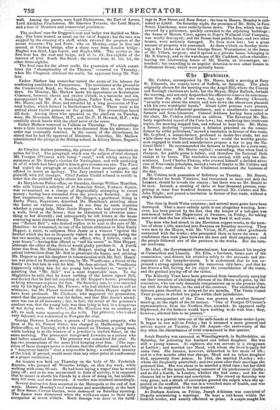Zbe Vrobintes.
Mr. Cobden, accompanied by Mr. Moore, held a meeting at Bury St. Edmonds, the county-town of Suffolk, on Saturday. The place originally chosen for the meeting was the Angel Hill, where the County and Borough elections are held; but the Mayor, Major Bullock, forbade the meeting, and not only despatched his officers to remove its announce- ment from the walls of the town, but, says the Morning Chronicle. "actually went about the streets and tore down the obnoxious placards with his own worshipful hands." About 3,000 persons were present, including several influential gentlemen, and a considerable number of farmers and farm-labourers. Colonel Addison having been called to the chair, Mr. Cobden delivered an address. The Reverend Mr. Ma- berly reprobated repeal of the Corn-laws ; but, wandering into irrelevant topics, the meeting stopped him, and refused to hear him. Mr. Hales, a farmer, declaring "protection a delusion practised on the tenant- farmer by artful politicians," moved a resolution in favour of free trade. Mr. Gayford, a tenant-farmer, professed to desire free trade, but not while there was the National Debt to bear : would the wealthy gentle- men engaged in trade and manufactures propose a tax to pay the Na- tional Debt? He recommended the farmers to bargain for a corn-rent, as he had done. Mr. Moore replied ; contending, that when food is cheapest, the public purse is fullest, and therefore the National Debt easiest to be borne. The resolution was carried, with only two dis- sentients. Lord Charles Fitzroy, who avowed himself a decided advo- cate of Free-trade principles, moved a vote of thanks to Mr. Cobden and Mr. Moore ; and thanks to the Chairman terminated the business of the day.
Mr. Cobden took possession of Salisbury on Tuesday. Mr. Benett, the Member for South Wiltshire, had threatened to meet and defy the Leaguer, should he invade the county ; but there was no Mr. Benett to be seen. Instead, a meeting of three or four thousand persons, com- prising at least four hundred farmers, received Mr. Cobden and Mr. John Bright ; and passed a resolution in favour of free trade, without a single dissentient.
The riots in South Wales continue ; and several more gates have been destroyed. That a more orderly spirit is not altogether wanting, how- ever, has been proved by the fact, that the keeper of a toll-gate was summoned before the Magistrates at Swansea, on Friday, for taking more toll than the law allowed ; and he was fined Si. and costs.
The men who had struck in the Morriston copper-works, to the num- ber of about 1,500, marched into Swansea on Saturday morning. They were met by the Mayor, with Mr. Vivian, M.P., and other gentlemen connected with the works ; who persuaded them to leave the town. A. conference then took place between the men and their employers ; and the people followed one of the partners to the works. But the tura- oet continues,
Mr. Hall, the Government Commissioner, has continued his inquiry at Carmarthen and Llanelly. Mr. Ellis, a barrister, forms part of the commission, and directs his attention solely to the accounts and ma- nagement of the turnpike-trusts. It is understood that he has ex- pressed a strong opinion against the numerous side-bars; and that he has drawn a bill, having for its object the consolidation of the trusts, and the gradual paying-off of the tallies.
The Kidwelly Trust have been prevented from immediately carrying out their intention of abolishing thirteen of the fifteen toll-gates, by the contractor, who not only demands compensation up to the present time, but 4601. for the future, to the end of the contract. The abolition of the thirteen gates therefore is delayed for six months. The Three Comet Trust propose to abolish ten gates within their jurisdiction.
The correspondent of the Times was present at another farmers meeting, on the night of the 3d instant. "One of Feargus O'Connor's representatives, from the Northern Star, attended: he appeared sadly frightened, for the farmers would have nothing to do with him ; they, however, allowed him to be present."
There is a general turn-out of the mill-hands at Ashton-under-Lyne. It began in one mill on Friday ; but it assumed a more general and serious aspect on Tuesday, the 8th August—the anniversary of the day when the disturbances of 1842 commenced in that quarter.
Sarah Dazeley was executed at Wrestlingworth, in Bedfordshire, on Saturday, for poisoning her husband and infant daughter. She was still a young woman. At eighteen she was servant to a clergyman at Ludlow ; and married one Mead, with whom she lived happily for some time. She became, however, debauched in her mode of life ; and in a few months after that change, Mead and an infant daughter died, apparently from poison. In 1842, she married Dazeley ; wits whom she frequently quarrelled ; and two years after their marriage she poisoned him. She was about to be married a third time ; but her third lover broke off the match, hearing rumours of his predecessors' deaths ; and so did a fourth, in London, whither she had come ; and his dis- closures led to her arrest and conviction. The crowd on Saturday was very great ; and a shriek of execration greeted the culprit when she ap- peared on the scaffold. She was in a wretched state of health, and was obliged to be supported to the last moment. At Durham Assizes, on Friday, Joseph Atkinson was convicted of illegally solemnizing a marriage. He kept a toll-house within the Scottish border, and usually officiated as priest. A couple sought hit offices, but found that he had gone to Berwick ; whither they followed him. At first he refused to marry them ; but b.ing made drunk, he omplied: a confusion of legal geography which caused him to be sen- tenced to seven years' transportation.



























 Previous page
Previous page